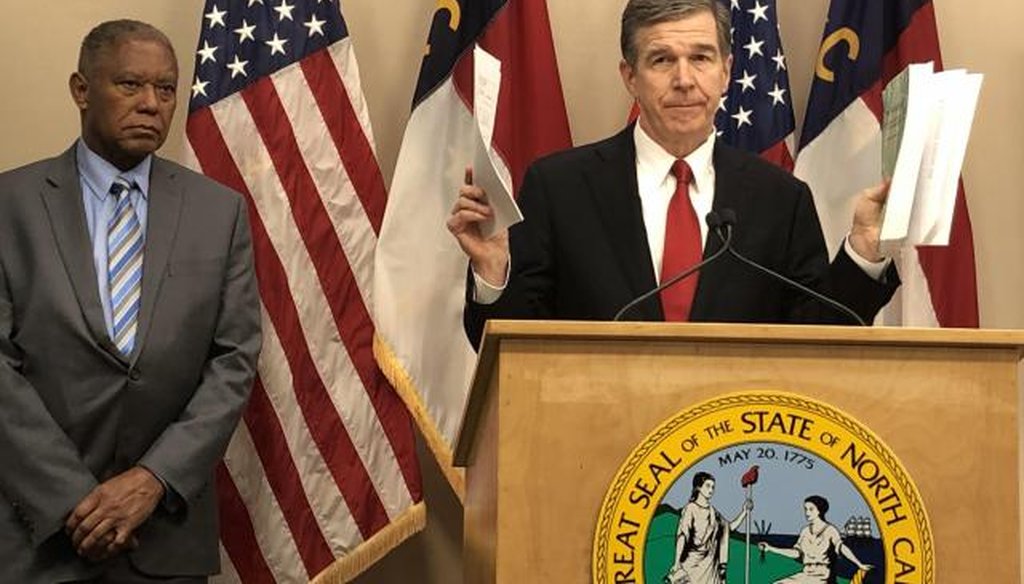



Gov. Roy Cooper holds the Republican budget in his left hand, his suggested changes in his right, as Senate Minority Leader Dan Blue looks on. (via WRAL)
North Carolina remains one of the only states in the nation that hasn’t enacted a new budget for this year.
That’s partly because Democratic Gov. Roy Cooper and the Republican-controlled legislature can’t agree on a plan for public education spending.
Amid the stalemate, Cooper just got a new talking point.
On Jan. 21, he tweeted:
"The Court has ordered North Carolina to step up significantly its funding for education," the tweet says, adding: "It should begin now with this budget."
Cooper’s tweet provided a link to a story by The News & Observer newspaper in Raleigh.
The education budget is usually set by state lawmakers (the House of Representatives and Senate pass a plan, then the governor approves it.)
So it might seem odd to the average person that a judge "ordered" North Carolina to spend more on education.
Is that really what happened?
Generally speaking, yes. But don’t expect your kid’s public school to receive a shipment of new resources anytime soon.
Cooper’s tweet references the latest development in what’s known as the "Leandro case." Here’s a brief history, courtesy of the N&O story:
Fast forward to 2020. The case is now overseen by Superior Court Judge David Lee, and he says the state still isn’t providing public school students with a proper education.
One thing that may be confusing: Lee’s latest filing is referred to as an order. That is legally what his document is called.
And, while Judge Lee did issue a directive to lawmakers, his orders weren’t specific.
"The judge did not enter an order that specifically said ‘the state of North Carolina must appropriate X number of dollars,’" said Jane Wettach, a law professor at Duke University and director of the school’s Children’s Law Clinic.
"What (the order) did do was say, it’s obligated to do a number of things, essentially to improve to the point of being adequate the education system in North Carolina."
We looked at the order. And, indeed, it states this on Page 4:
"As outlined in greater detail below and in accordance with the Court’s prior rulings, the Court orders the Defendants, in consultation with each other and the Plaintiffs, to work expeditiously and without delay to create and fully implement a definite plan of action to achieve Leandro compliance."
Then on Page 5, Lee says a more specific plan will come later:
"This Court will issue a subsequent order or orders regarding the definite plan of action and its critical components, including the identifications of specific, concrete, definitive actions (preliminarily short-term actions and mid-term and long-term action plans) that will be taken to implement the above seven components and to correct the constitutional deficiencies, so that the State may finally meet its constitutional obligations to North Carolina’s children."
Judge Lee based his order on a report by WestEd, an independent firm brought in to examine North Carolina’s education policies.
The report not only analyzed the state’s spending, but "further proposes detailed recommendations for increased funding efforts by the State in order for North Carolina's system of public schools to become Leandro compliant," said Lindsay Wagner, a senior researcher at the nonpartisan advocacy group: Public School Forum of North Carolina.
In response, the judge’s order tells defendants to craft a plan of action. But "the order does not explicitly require additional funds, rather it requires that additional resources, ‘if any,’ to meet the requirements identified," Ann McColl, an education attorney.
The order said a plan of action must include seven components:
The judge then notes that it's the "state’s duty" — rather than the judiciary’s duty — to implement the necessary programs. The order directs the parties involved with the case to provide Lee with a status report "no later than 60 days" of the order, which was signed Jan. 21.
McColl noted that the GOP-controlled General Assembly isn’t named as a party to the case. But it could participate in implementing the plan.
"Because the order is to respond with plans for the immediate future (2020) and mid-range and comprehensive plans, there is not a specific order requiring specific action by the General Assembly at this time," McColl said.
"At a time when specific steps are submitted to the court and the court approves them, there may be specific actions required of the General Assembly," McColl added. "If the GA does not comply with these orders, the court has some tools – although limited and difficult with a legislative body, to enforce orders."
Cooper tweeted that "the Court has ordered North Carolina to step up significantly its funding for education."
Judge Lee didn’t give specific instructions for how much lawmakers need to spend on public education. But he did order North Carolina to spend more on its education system. Cooper’s statement is accurate but needs clarification or additional information. We rate it Mostly True.
Tweet by North Carolina Gov. Roy Cooper on Jan. 21, 2020.
Email correspondence with Ford Porter, spokesman for Gov. Roy Cooper.
Consent order regarding need for remedial, systemic actions for the achievement of Leandro compliance, filed by North Carolina Superior Court Judge David Lee on Jan. 21, 2020.
Story by the News & Observer, "Judge says NC is leaving ‘too many’ students behind, orders state leaders to act," Jan. 21, 2020.
Interview with Jane Wettach, a law professor at Duke University and director of the school’s Children’s Law Clinic.
Interview with Lindsay Wagner, a senior researcher at the nonpartisan advocacy group Public School Forum of North Carolina.
Interview with T. Greg Doucette, criminal attorney based in Durham, NC.
Interview with Ann McColl, co-founded The Innovation Project, a consortium of superintendents working together to strengthen public education.
In a world of wild talk and fake news, help us stand up for the facts.
